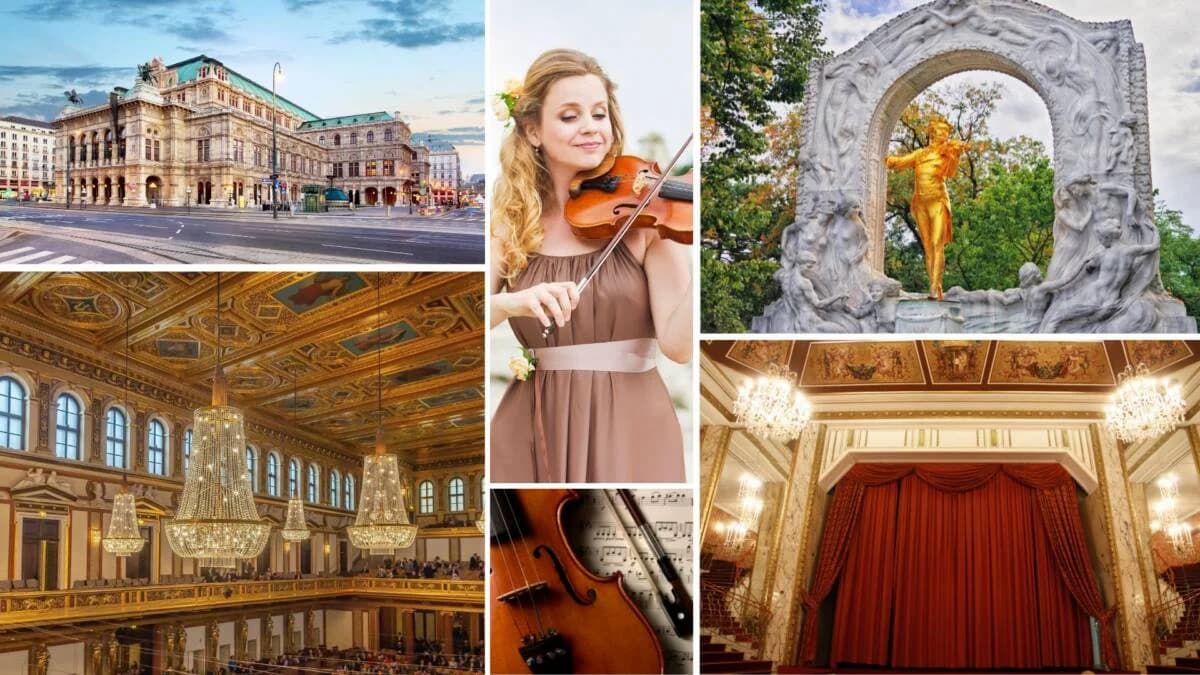Which Composers Lived in Vienna?
If there’s a world capital of classical music, Vienna is it.
From the mid-eighteenth century up until the present day, Vienna has flourished as a musical center.

© rosotravel.com
The city attracted a veritable constellation of composers who forever altered the course of music, from Mozart and Haydn to Brahms and Bruckner, to the members of the Second Viennese School.
Today we’re looking at the lives and legacies of the classical musicians who, at one point or another, called Vienna home – and how the city affected their musical development and output.
Joseph Haydn (moved to Vienna in 1740)
Haydn was born in the small town of Rohrau, Austria in 1732.
When he was just eight years old, he was selected to sing in the St. Stephen’s Cathedral in Vienna, which he did for nine years. Afterward, he worked as a freelance musician in Vienna in the 1750s.
His big professional break came in 1761 when he was hired to work in the court of the Esterházy family. Unfortunately for Haydn, they lived in a rural palace, where Haydn was forced to live for most of the year. The isolation often led to Haydn feeling lonely and creatively marooned.
In 1795 the Esterházy family downsized their staff, enabling Haydn to retire from service and live where he wanted. He made two lucrative trips to London but ultimately returned to Vienna, where he lived as a celebrity until he died in 1809.
Sadly, living in Vienna in 1809 meant that his final months were spent under bombardment by Napoleon’s troops.
Wolfgang Amadeus Mozart (moved to Vienna in 1781)
Although he was born in Salzburg, Austria, Mozart spent his younger years traveling the world as a child prodigy. In the 1770s, he tried to find work in Vienna but was unsuccessful.
He spent his young adulthood working for Prince-Archbishop Hieronymus Colloredo in Salzburg. However, the two came into frequent conflict since Mozart wanted to keep his Salzburg job while also pursuing other creative opportunities.
They finally parted ways in 1781. Much to his father’s distress, instead of begging for his job back, Wolfgang left for Vienna to make his name as a freelance musician.
While in Vienna, he roomed with a family and started dating one of the family’s daughters, who he eventually married. He got to know a variety of famous Viennese musicians, including Haydn (they would sometimes play quartets together). He became known as the best pianist in town and wrote an opera – The Marriage of Figaro – that became the talk of the town in 1786.
Unfortunately, over the next few years, he began earning less money than he had been, in part due to the Austro-Turkish War and Viennese aristocrats tightening their belts. He went into debt and wrote less.
However, it seemed as if his life might be on the upswing again in 1791: he secured some wealthy patrons and he was writing more. But he died in December of that year.
Franz Schubert (born in Vienna in 1797)
Schubert was born in what was then a Vienna suburb called Himmelpfortgrund. As a young boy, Schubert began studying music at the Stadtkonvikt, or Imperial Seminary. He also studied with Antonio Salieri, who was the best-known teacher in the city.
When Schubert was a young man, his Viennese friends were important to his artistic development. As a young man, he began performing his music at private homes. These events became known as Schubertiades. This is the primary way that his music was disseminated.
The Schubertiades gained a reputation. In fact, in 1820, Schubert was arrested by the Viennese police, who were deeply paranoid about any events that might foster revolutionary thought after the country’s run-in with Napoleon.
Schubert died in 1828 in his brother’s Viennese apartment.
Johann Strauss II (born in Vienna in 1825)
Strauss was born in a Viennese suburb to composer Johann Strauss I and his wife. The elder Strauss did not want his son to pursue a career in music and was incensed when he found out his son was secretly learning how to play the violin. The two eventually became fierce rivals.
Although he became internationally famous and toured the world, Johann Strauss II’s music became synonymous with Vienna. His most famous waltz is “The Blue Danube”, a reference to the river that flows through the city.
Franz von Suppè (moved to Vienna in 1840)
Franz von Suppè was born in present-day Croatia in 1819. His father worked for the Austrian Empire and his mother had been born in Vienna, so even though he wasn’t born there, he had strong ties to the city.
Starting in 1840, he began working in Vienna, and by 1845 he was appointed the Kapellmeister at the Theater an der Wien, a storied venue.
Over the course of his long career, he wrote dozens of popular operettas and stage works, in the process helping to shape the genre of Viennese operetta.
He died in Vienna in 1895.
Johannes Brahms (moved to Vienna in the early 1860s)
Johannes Brahms was born in 1833 in the commercial harbor city of Hamburg, Germany. In 1862 he visited Vienna and decided to move there.
In 1863 he got a job as the director of the Wiener Singakademie, a chorus based in the city, but he departed a year later, believing the job ate up too much composing time.
Between 1873 and 1877 he tried out another position, this time as director of concerts of the Vienna Gesellschaft der Musikfreunde, but that didn’t turn into a long-term position, either.
Many premieres of Brahms’s best-known works occurred in Vienna. That said, Brahms was so nervous about the Viennese public’s reaction to his first symphony that he arranged for the premiere to occur in Karlsruhe, Germany. He needn’t have worried. Although the reaction was somewhat muted, Viennese audiences grew to deeply respect his music.
Brahms died in Vienna in 1897.
Anton Bruckner (moved to Vienna full-time in 1868)
Bruckner was born in the village of Ansfelden, Austria, in 1824. From an early age, he enjoyed playing the organ in church and in 1845 he became a teacher and an organist in the town of Sankt Florian, Austria, where he worked for ten years.
In his thirties, Bruckner decided to study composition more seriously. He began working with Vienna-based teacher Simon Sechter in 1855. By the 1860s he began splitting his time between Sankt Florian and Vienna.
In 1868, Sechter died and Bruckner took his place teaching at the Vienna Conservatory. In 1875 he took a position at Vienna University. There were factions in Vienna that didn’t like him or his music, and he was unhappy living there.
He died in Vienna in 1896 but was buried back in Sankt Florian.
Arnold Schoenberg (born in Vienna in 1874)
Arnold Schoenberg was born in a former Jewish ghetto in Vienna. It was a difficult time to be Jewish in Vienna, as anti-Semitism was rampant. He converted to Lutheranism in 1898, but in the 1930s returned to Judaism.
Schoenberg was driven and largely self-taught. As a young man he made a living orchestrating operettas and composing his own music.
In 1908, during a difficult time when his wife was spending a few months with a lover, he began experimenting with atonality in earnest.
These kinds of experiments proved challenging to audiences, and so in 1918, he founded the Verein für musikalische Privataufführungen, or Society for Private Musical Performances, which would enable composers to find paying audience members who were interested in hearing avant-garde music. The project lasted until 1921 and introduced Viennese audiences to many new works.
In 1926 he began teaching in Berlin. When the Nazis came to power, he and his family fled to America. Eventually he became an American citizen. He died in California, but his ashes were interred in Vienna.
Anton Webern (born in Vienna in 1883)
Webern was born in Vienna in 1883, but he spent much of his childhood in the Austrian cities of Graz and Klagenfurt, as well as at his family’s country estate.
In 1902 he began studying at Vienna University and eventually under Schoenberg, who became a trusted friend and colleague.
After the First World War he helped organize performances by the Society for Private Musical Performances. Even after the society disbanded, Webern continued writing avant-garde music and promoting the work of other modern composers.
When the Nazis rose to power, Webern’s music was labeled as cultural Bolshevism and his career suffered. At the same time, he was ambivalent toward aspects of Nazism, and did not condemn Hitler.
In September 1945 he died in Vienna when an American soldier accidentally shot him as he smoked a cigar.
After his death, his widow wrote that they had intended to leave Austria for England: “How difficult the last eight years had been for him. [He] was so embittered that he had only one wish: to flee from this country. But one was caught, without a will of one’s own. … It was close to the limit of endurance what we had to suffer.”
Alban Berg (born in Vienna in 1885)
Berg was born to a wealthy Viennese family in 1885. In 1904 he began studying music with Schoenberg, and he became active in artistic Viennese social circles.
Along with Schoenberg and Webern, he helped run the Society for Private Musical Performances in Vienna.
In the 1930s, Nazi officials looked askance upon Berg, given his affiliation with Schoenberg. He died at the age of fifty in Vienna in 1935 of blood poisoning caused by an infected insect bite.
Erich Wolfgang Korngold (moved to Vienna in early 1900s)
Korngold was born in Brno in the present-day Czech Republic. It soon became obvious he was a child prodigy of the first rank, and soon the family moved to Vienna, where he began studying with teacher Alexander von Zemlinsky as a boy.
When he was eleven, his ballet Der Schneemann (The Snowman) was produced by the Vienna Court Opera. Over the following years, he proved to be a prolific composer, coming out with everything from chamber music to operas.
As a young man, he joined the faculty of the Vienna Staatsakademie and began teaching opera and composition there. The president of Austria named him a professor honoris causa.
In 1935, Korngold left for America to score films. After the Nazis came to power, they confiscated his home while he was overseas.
Korngold stayed in America, later remarking, “We thought of ourselves as Viennese; Hitler made us Jewish.”
He became an American citizen in 1943. The fairytale Vienna of his youth was forever vanished.
For more of the best in classical music, sign up for our E-Newsletter

